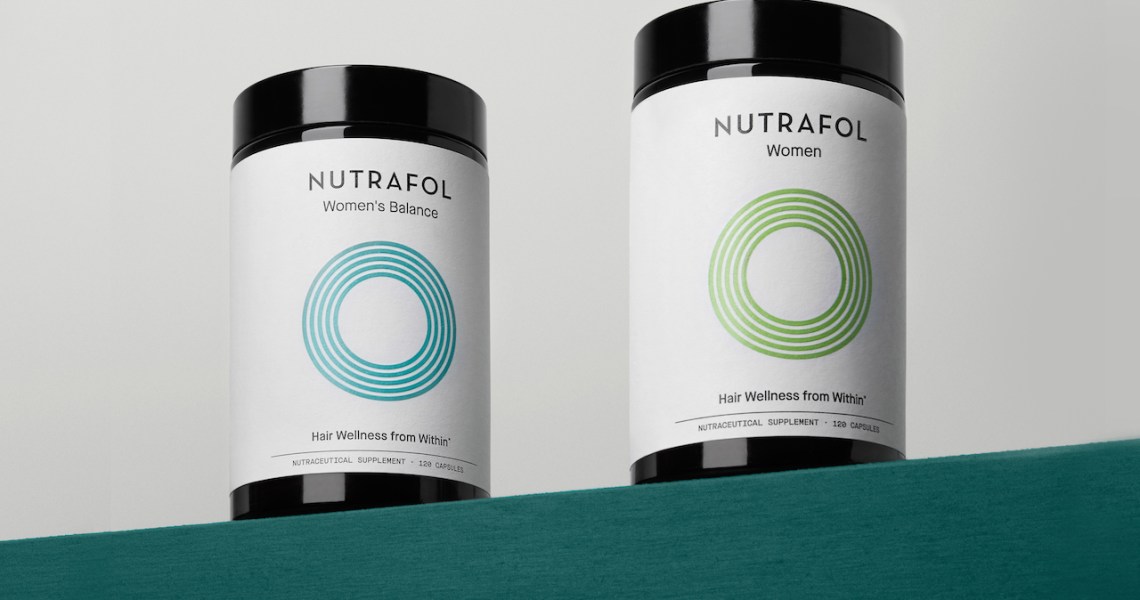Consumers’ hair loss during the pandemic has meant sales growth for hair treatment brands.
“Hair wellness” products aimed at curbing hair loss or promoting growth, including supplements, medications and styling products, have seen an increase in online searches and sales during quarantines. An uptick in stress-induced hair loss has been cited as a possible reason, as has a general rise in awareness of women’s hair-loss treatments and the self-care effect. Up-and-coming digitally native startups have seen some of the most significant results.
Between March and May 2020, hair growth supplement brand Nutrafol saw a 61% increase in new customer sales of its women’s supplement and a 30% increase for its stress adaptogen supplement. Hum Nutrition has seen 160% new customer growth in its hair supplements in Q2 compared to Q1 2020. And the growth isn’t just happening for women’s products: For hair-loss startup Keeps, new customer revenue grew 77% between February and May.
During the last few months, customers have been focusing on wellness and self-care. Masks, scalp scrubs and leave-in conditioners have become part of regular beauty routines. And, products that focus on overall hair health like Dallas Thickening Shampoo, that contain Biotin, have doubled or in some cases tripled in sales.
As women’s lifestyle publications like Cosmopolitan and Shape have provided anecdotal evidence of the trend of quarantine-induced hair loss, interest in hair-loss products has risen during the pandemic. According to Alisha Kapur, beauty and personal care industry consultant at SimilarWeb, searches for hair-loss products have spiked. From March to May 2020, year-over-year searches for “hair loss” on Sephora’s site rose by 409%, while searches for hair-loss treatment ingredient biotin rose by 291% in the same time period on Ulta.
“If you’re experiencing stress right now, your stress hormone cortisol is activated, and what it does is it actually pushes the telogen phase, which is hair shedding,” said Giorgos Tsetis, the founder and CEO of Nutrafol.
Matt O’Connor, gm of Keeps, said, “One of our advisors, dermatologist Dr. Antonella Tosti, said that she and other clinicians have seen an increase in patients during this time period. One theory as to why this could be the case is that stress is a contributing factor to temporary hair loss.”
The self-care effect has also led to strong sales of many kinds of supplements, said Hum Nutrition co-founder and CEO Walter Faulstroh. “Our sales for hair products went up just as much as for everything else, so I would say the consumer is really mindful, not just about immune-related concerns but really overall,” he said.
Dan Langer, President of R+Co and chief marketing officer of Luxury Brand Partners, said, “During the last few months, customers have been focusing on wellness and self-care. Masks, scalp scrubs and leave-in conditioners have become part of regular beauty routines. And products that focus on overall hair health, like Dallas Thickening Shampoo that contains Biotin, have doubled or, in some cases, tripled in sales.”
Ad position: web_incontent_pos1
Another factor is simply the increased awareness in the U.S. market of women’s hair loss and wellness. Nutrafol, for example, has been focusing its marketing of women’s products around removing the stigma from women’s hair loss. Keeps hasn’t changed its marketing strategy during the pandemic.
“When we started the company, about six years ago, you couldn’t even talk about hair loss for women,” said Tsetis, who noted that magazines would reject Nutrafol ads related to women’s hair loss. “It was too much of a taboo.” The brand recently launched a campaign “focusing on women pre- and post-menopause, which is a key audience for us,” he said.
As the issue becomes more visible, digitally native startups are moving in on the market to address women’s hair loss. Tara, a DTC hair-growth brand focused on female consumers, is currently in the process of expanding from the Middle East into the U.S., U.K. and Australia.
“There’s a stigma behind it,” said Tara community manager Courtney Wilkins of women purchasing hair-loss treatments. “Women feel more comfortable about using something that’s not solely branded as regrowth, but more as revitalizing and creating shiny or fuller-looking hair.”
Quarantine or no quarantine, hair wellness startups are “bullish” about the market, said Tsetis. “Six years ago, it was weird to take pills for your hair. Biotin was the only product out there.” He said that the company plans to double or triple its sales this year.




